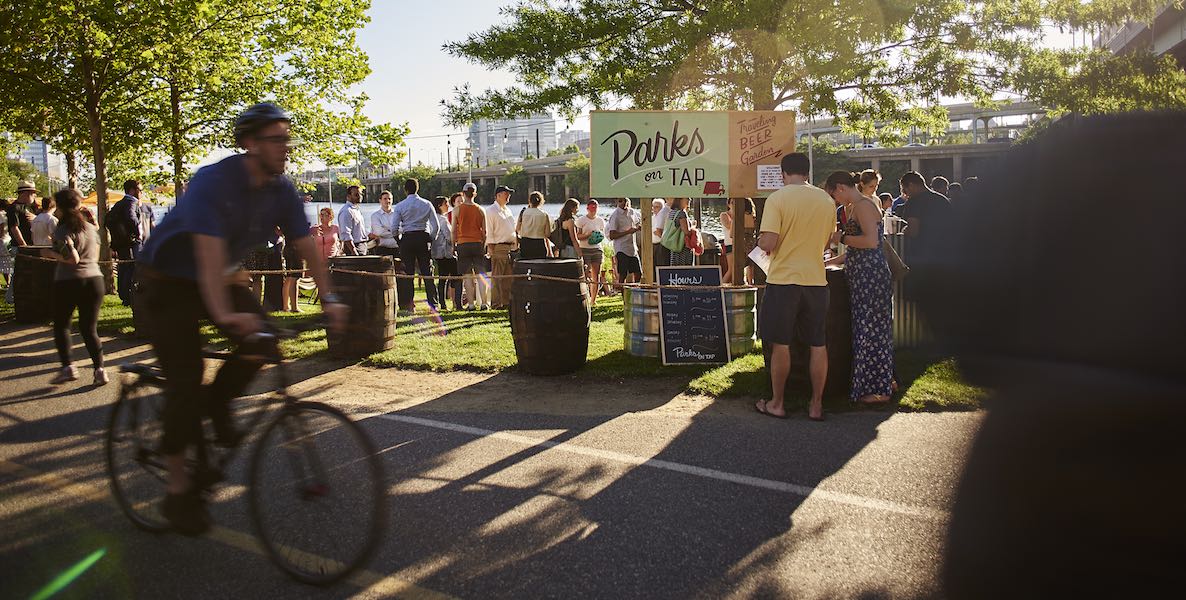Drinking a cold beer on a hot summer day hardly seems like an act of civic engagement. But when Philadelphia Parks and Recreation, Fairmount Park Conservancy and FCM Hospitality joined forces to launch Parks on Tap in June, developing a stronger bond between citizens and their public spaces was exactly what they had in mind.
Their idea was simple: Create a mobile beer garden that would travel to a different city park each week for 14 weeks with the hope of getting people to interact with their parks—and each other—in a different way.
That meant introducing people to parks they might not have otherwise visited or seeing their favorite green space in a new light. By providing hundreds of lawn chairs and hammocks, games and activities for kids all alongside beer and food trucks, the group has transformed city parks into spaces that Parks and Recreation Commissioner Kathryn Ott Lovell says will “introduce residents and visitors to Philadelphia’s incredible, and often unknown, assets in a fun and engaging way, connecting them to our rich culture, history and distinction of having one of the top park systems in the world.”
But how would Parks on Tap know if it was successful? Revenue was a plus, but it wasn’t a requirement for Parks on Tap, as long as the venture doesn’t lose money. They were after large crowds, families and people from different neighborhoods. “When we hear things like, ‘when are you coming back?’ over and over, it tells us we are doing something right,” says Marc Wilken of Parks and Rec.
Now, before the first season is even over, Philadelphia’s Parks on Tap has inspired the city of Memphis, Tennessee to create its own version of the program.
Memphis’s Maria Fuhrmann first traveled to Philadelphia last summer on a scouting trip in search of solutions to a problem she thought Philadelphia would have the answers to: How could Memphis best use its underutilized land resources to serve people in new ways, especially along the waterfront?
Providing beer in public spaces can be just the social lubricant needed to fuel relationships, whether in a local corner park, a downtown lot or a bluff overlooking the Mississippi. But it is more than that: It’s an invitation to citizens to embrace their cities, sending a message that they are dynamic and welcoming and cool—which cities need to thrive and grow.
Fuhrmann, who is in charge of grants and partnerships for Memphis, found Spruce Street Harbor Park, Eakins Oval and the Pennsylvania Horticultural Society Pop-Up Gardens “totally inspirational.” But it wasn’t until Parks on Tap that Fuhrmann saw something that was of the right scale for Memphis and its goal of reimagining what the city’s downtown could become if people stayed and socialized after work.
Last Friday, Memphis launched “Fourth Bluff Fridays,” a Philly-inspired pop-up beer garden series in a little-used park that overlooks the Mississippi River. Somewhere between 300 and 400 Memphians showed up for beer, food trucks, lawn games and music, with several noting that it seemed like the event had always been there. Like in Philly, the event was an immediate sensation.
“We really hope that good live music, food, beer, and just a fun time can help bring people together in a public space and show that no matter which part of town you’re from, we’re all pretty similar, and we all have a whole lot more in common than we have different,” said McCauley Williams of The TapBox, a mobile beer vendor that was one of the city’s partners on the project.
The message Fuhrman gleaned from Philadelphia is simple: Providing beer in public spaces can be just the social lubricant needed to fuel relationships, whether in a local corner park, a downtown lot or a bluff overlooking the Mississippi. But it is more than that: It’s an invitation to citizens to embrace their cities, sending a message that they are dynamic and welcome and cool—which cities need to thrive and grow. Beer in parks does not solve the urban ills that plague cities like Philly or Memphis; but maybe it can be a first step towards building a community that cares enough about its city to make real changes.
In Memphis, Fourth Bluff Fridays also had a civic healing element. Until 2013, the park hosting the event was called Confederate Park. After a contentious citywide debate, it was renamed Memphis Park—a name too generic for the taste of many. Earlier this year, a civic challenge led to the temporary renaming to Fourth Bluff Park—but it also stirred up old wounds. Now the city hopes its Fourth Bluff Fridays will gently nudge Memphians toward that more inclusive name — and a more inclusive event.
“We can activate underutilized spaces with these events, and we can come together,” said Williams. “The cool thing about a public space like a park, as opposed to a traditional venue like a warehouse or a concert hall, is that it is a public space, so we want to encourage people of all walks of life to come. We really want to see a wide variety of our city’s population.”
Next month, Memphis will host its next “Fourth Bluff Fridays,” but Fuhrmann hopes others will continue with the spirit of the event before it gets here. She encouraged food truck entrepreneurs and citizens to make the Fourth Bluff a place to be for Memphians—just like she saw last summer at Spruce Street Harbor Park and Eakins Oval—with or without a specific event planned.
“You all have the power to do this without the city,” Fuhrmann told vendors and event-goers, “and I hope you do.”
Parks on Tap along the Schuylkill River | Photo by Albert Yee / Fairmount Park Conservancy


